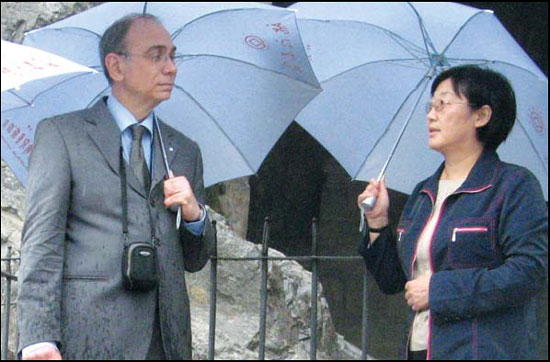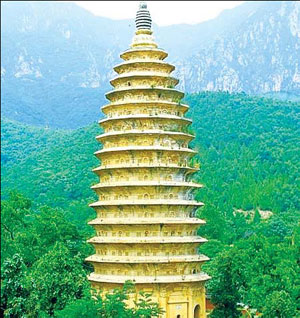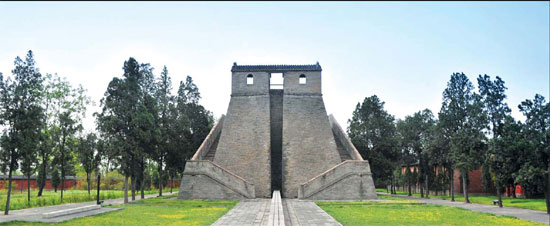|
|

Chen Ailan (right), director of the Henan Administration of Cultural Heritage, visits the Longmen Grottoes in Luoyang with a cultural heritage expert from Italy. Photos by Zheng Taisen / For China Daily
|
With support from the local and national government, great progress has been made in efforts to protect the wealth of cultural heritage sites in Henan province, one of the places where Chinese civilization first originated, a senior official said.
Chen Ailan, director of the Henan Administration of Cultural Heritage, said that officials are doing everything possible to ensure the protection of world cultural heritages in Henan as part of nationwide efforts to promote Chinese culture.
With support of the State Administration of Cultural Heritage, the province has successfully applied to have several of its sites added to the UNESCO World Heritage List, including the Longmen Grottoes, Anyang's ruins from the Shang Dynasty (c.16th century -11th century BC), and the historic monuments in Dengfeng known as "The Center of Heaven and Earth", Chen said.
To strengthen the province's reputation as a home for historical sites, local leaders also plan to apply to UNESCO for the addition of the Grand Canal and the Silk Road, vital transportation channels in ancient China, she said.
A total of 41 cultural heritage sites are located along Henan section of the Grand Canal, Chen said, adding that conservation efforts in the southern part of the Grand Canal cover the remains of river ways, headwaters, docks, irrigation projects as well as historical and cultural relics in towns and cities along the river.
With a mild climate and a pleasant environment, the province covers an area of 167,000 square kilometers. More than 65,519 historical sites are located in Henan, including such famous ancient structures as the Shaolin Temple and the Old Residence of Du Fu, a renowned poet in Tang Dynasty (AD 618-907), as well as Songyang Academy, one of the famed education institutions in the Chinese history.
As the political center of ancient China, Henan was also home to half of the nation's ancient capitals, including Zhengzhou, Luoyang, Anyang and Kaifeng.
|

Pagoda in Songyue Temple.
|
Many ancient emperors were buried in Henan, creating vast complexes of graves that form unique cultural tourism sites, such as the Emperors Tombs of the Eastern Zhou Dynasty (770-256 BC) and the Emperors Tombs of the Song Dynasty (960-1279).
"The process of applying to be on the World Heritage List is really an arduous task, and we are making great efforts to work on it through legislation, management and conservation," said Chen, adding that laws and regulations have been formulated to protect and standardize the application for each project.
She said that the local government has also invited a group of experts and specialists from China and abroad to carry out scientific management plans to ensure the sustainable growth of the province's cultural legacies.
"Those professionals are conducting scientific research on the characteristics of different cultural heritages to offer suitable protection measures for each site," Chen said.
She also noted that maintenance proposals are made through surveys and studies on the underground historical ruins and architectures above the ground, which from her perspective is "the basis for the protection and consolidation of cultural heritages".
"Beautifying and restoring the surrounding environment is also very important," she said. "For instance, we have to remove or demolish the unmatched landmarks close to the targeted heritage to make it look more natural," Chen said.
She added that the local government has also made great efforts to publicize the world heritages sites to raise people's awareness to protect those national treasures.
In the future, Chen said that the province will continue to be committed to the protection of heritage sites.
"The first step is to strengthen the enforcement of relevant laws and regulations, and we will be dedicated to protect the cultural heritage sites," said Chen.
She said that in July this year, the provincial government implemented a newly established policy named Shang Dynasty Ruins Protection, which gave guidelines on the overall development of heritage sites and enlarged the protected area of the Anyang ruins.
Chen also noted that construction of protection and research bases at world cultural heritage sites is the province's top priority, which will "not only accelerate the cultural heritage industries in Henan, but also help improve the capability to protect culture heritages of the same kind".
In September, the organizing committee of the World Culture Heritage Protection Forum, which was held in the Longmen Grottoes in Luoyang, invited some 20 reputable experts and specialists to discuss proposals for building such research bases.
"We are already making preliminary plans for the construction work despite the unpredictable problems ahead," Chen said.
Over the past years, the province has cooperated with many cultural museums in foreign countries, including the United States, Canada and Japan, and it will continue to deepen partnerships with those cultural institutions through academic exchange and research.
Contact the writer at shibaoyin@chinadaily.com.cn
|

The star observation platform of the historic monuments in Dengfeng known as "The Center of Heaven and Earth".
|
(China Daily 12/27/2012 page18)
|